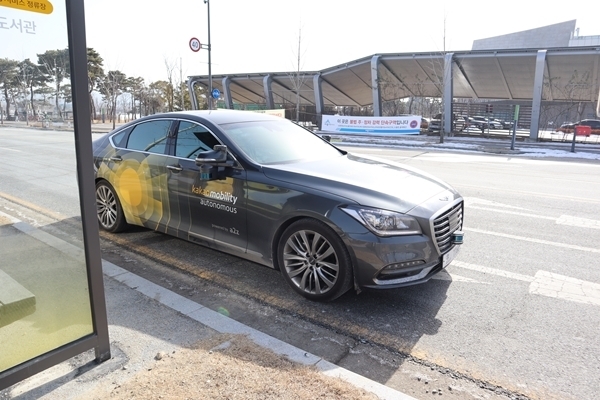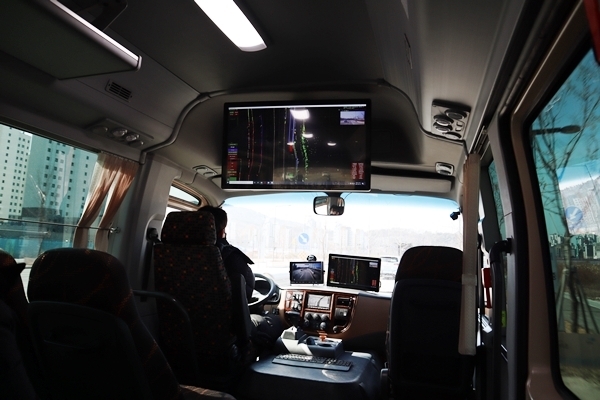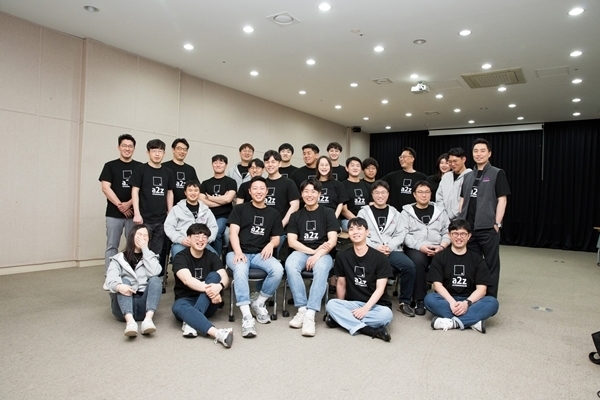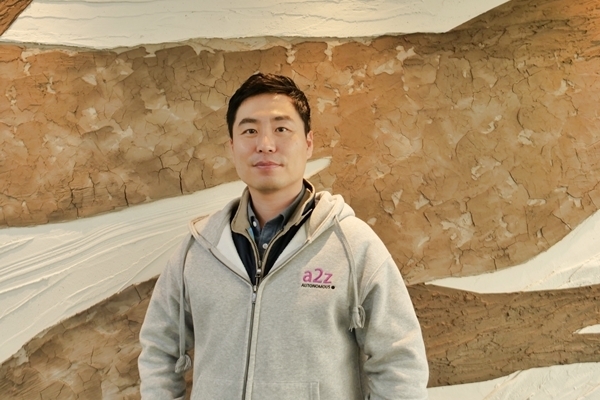Press Autonomous a2z CEO Han Ji-hyeong, '0.1%' making autonomous driving cars
페이지 정보
작성자 Autonomous a2z 조회 1,145 작성일 2021-12-27본문
▲오토노머스에이투지 대표 한지형 (사진제공=헬로티)
"Nobody can't do it, someone has to do it... Somehow, I'm carrying this burden. (Laughs) It's a tough road, but if I get frustrated saying I can't do it here, my fellow startups, junior companies, I'm also afraid that the partner companies will be knocked down by saying, 'Is our country really difficult?'"
"To the CEO, what is autonomous driving?". At the end of the interview, following the closing scene of a famous entertainment program, he could not easily continue his words, answering any questions that were unexpectedly answered half-jokingly. Among the words that came out because I could not find an appropriate expression, I could feel a complex heart that could not be defined in a few words, and a strong sincerity nonetheless.
CEO Han Ji-hyeong, who he founded, hopes that Autonomous a2z will create many jobs as the center of the industry in the upcoming autonomous driving market. Before founding Autonomous a2z, CEO Han Ji-hyung worked for Hyundai Motor Company for 11 years. For his first six years, he was responsible for general production vehicle development PM (Project Manager), and later for autonomous vehicle development.
At that time, before Hyundai Motors established Momental, a joint venture, the IONIQ self-driving car that Chairman Jeong Eui-sun rode in at CES 2017 and the NEXO free-driving car that President Moon Jae-in test-drives at the Pyeongchang Olympics are all the work of CEO Han Ji-hyeong and colleagues.
After leaving Hyundai Motors, CEO Han Ji-hyeong, who was working to train juniors at Kyungil University, started Autonomous a2z with four fellow researchers. Engineers who worked together in the automobile industry such as Hyundai Motor Company, Mando, and Ire AMS, and developers who worked in the IT/communication industry such as Samsung, LG, and SKT gathered together.
“Since the people who used to mass-produce in the field work together, I have a strong belief that development for actual mass production rather than research for research is necessary. I'm doing it."
Autonomous a2z is conducting self-driving demonstration projects in local governments such as Sejong, Gwangju, Ulsan, and Daegu. In Seoul, Pangyo, Gyeongbuk, Hwaseong, and Gangwon-do, they are testing autonomous driving by building their own maps.
In December 2020, Kakao Mobility and the autonomous driving robot taxi paid service launched together in Sejong City are hotly covered in various news media, signaling another leap in autonomous driving technology in Korea.

▲ In December 2020, Autonomous a2z launched a self-driving robot taxi service for the first time in Korea with Kakao Mobility and Sejong City.
.
“About February of last year, Kakao Mobility met with many autonomous driving companies across the country to create an autonomous driving service linked to Kakao T. However, there were not many companies with the technology capable of carrying ordinary customers with autonomous driving on the road at the time. At that time, it was a little over a year after we founded our company. We were connected by chance, and the person in charge got to ride our self-driving car, and it was said that we would collaborate. I did it too."
CEO Han pointed out, "I am drawing a picture of working with Kakao in a smart city business in the future." In the smart city, Kakao is in charge of the mobility service, and Mobility is a picture created by Autonomous a2z.
"Road environment, communication technology, and infrastructure for autonomous driving. Smart city is what contains all of these. From an engineer's point of view, it would be difficult to 100% autonomous driving in the current road environment. There are too many variables that are difficult to overcome, such as vehicles, jaywalkers, and animals such as stray cats. Unmanned mobility can roam freely in areas such as smart cities where an environment where autonomous vehicles can operate safely is created. If a smart city is created that considers autonomous vehicles from the design stage, such as fenced roads for self-driving cars and road infrastructure that alerts users to dangerous situations in front, I think 100% autonomous driving as we think about it will be possible.
Autonomous a2z aims to create special-purpose vehicles such as shuttle buses, delivery cars, patrol cars, and cleaning cars that can travel on roads unmanned in a smart city.
“The reason I used the word ‘on the road’ is to emphasize that mobility on the road is a ‘car’ that complies with the Road Traffic Act and the Automobile Management Act. Mobility on the sidewalk may look similar, but to be precise, It's a 'robot'. Cars and robots are completely different in technology and have different laws and regulations. Our goal is to make a vehicle that runs on the road."
Although Autonomous a2z is working day and night with the goal of mass-producing autonomous vehicles, CEO Han Ji-hyeong said that he did not intend to create a self-driving 'car' from the beginning.
“Since it is in the R&D stage, we buy cars and trucks and convert them into autonomous vehicles. Delivering software directly to automotive OEMs is realistically difficult, and the software must be installed somewhere, so I thought that the answer would not come out unless I made my own car to put the software on.”
In fact, global autonomous driving developers such as Nuro and Zoox in Silicon Valley in the US have also chosen to manufacture autonomous vehicles on their own.
“Actually, it is very difficult to make a car. I was able to target the mass production of autonomous vehicles because most of the company’s engineers, including myself, had experience working in an automobile company. It is a situation in which the overall system is fully understood. Even so, it is realistically difficult for a startup like us to make a high-speed general car. I thought that a special purpose vehicle that moves at low speed within a limited area would be worth trying.”
As explained by CEO Han Ji-hyeong, autonomous driving software development and autonomous vehicle manufacturing are completely different fields. The dominant reason is that even the self-driving car Apple Car, which is being prepared by super IT giant Apple, will be difficult to launch without cooperation with existing car manufacturers. We asked about the specific strategy of Autonomous a2z in relation to the mass production of vehicles.
“We plan to make a T-car by 2023, a prototype car by 2024, and a pilot car by 2025. We will develop a car that complements safety and durability and satisfies all relevant laws and regulations while going through steps similar to the general vehicle development process. 2025 A large-scale demonstration project related to self-driving starts around circa 2020. The goal is to select a city and collect the results of various autonomous driving-related R&D projects carried out by the government so far and actually serve the public. Our primary goal is to improve the level of perfection by conducting various tests linked to actual services for two years here, and the final goal is to mass-produce it in 2027.”
As I listened to CEO Han Ji-hyeong's story, I thought, 'Maybe it's because people from car companies have gathered, so they never think about making cars in vain.' CEO Han Ji-hyeong raised his voice that, above all else, the completeness of the car is important because it is necessary to mass-produce cars that run on public roads.
“The completeness of a car depends on the quality
of the parts. The parts have to be well made, but the car comes out perfect.
There are cases where we buy similar parts and process them, or we use small
companies to make it difficult, but we work directly with real auto parts
makers. We will develop it and make a proper car.”

▲ Autonomous a2z's autonomous vehicle platform
We asked what difficulties there were as a company developing autonomous driving.
“Even now, autonomous driving works perfectly well under normal driving conditions. But if, for example, a motorcycle suddenly crosses a lane while driving, it is a situation in which an accident is inevitable even if a human is driving. Even under the circumstances, if an accident occurs, it is a huge blow to the company that makes autonomous vehicles. There is a difficulty in how to develop technology to cope with unavoidable situations. Second, the investment environment is disappointing. In the case of the United States or China, startups that are competent enough to test on the road like us receive a trillion-dollar investment and test hundreds of autonomous vehicles. Most of the 10 autonomous vehicles we currently own are being created and operated with the budget secured through government R&D projects. I think it would be great if an investment environment like that could be created where you can wait like swelling.”
At the end of the interview, I finally asked, 'What is autonomous driving to the CEO?' I wondered why he was driving autonomously. CEO Han Ji-hyeong's answer included things such as the path he had walked as a researcher, accumulated experiences, and time.
"Being in the industry for more than 10 years, you can understand the trend of the automobile market. If you don't do autonomous driving, I thought that the industry could be over in a decade or two. If you look at the structure of Korea's autonomous driving industry now, about 80% of parts companies and 20% of companies preparing services under the premise that autonomous vehicles are coming out. It is a situation where the picture is completed and the ecosystem is built only when a company that makes autonomous vehicles enters the middle.”

▲ Group photo of employees of Autonomous a2z Pyeongchon branch
"Autonomous driving...it's a very difficult road to say, and it's impossible not to... If you work hard, there are times when you suddenly wonder if it's really the right thing to do. It's the same thing. I regret it if I did it, and I regret it if I didn't, but looking back, I think I would regret it even more if I hadn't chosen autonomous driving."
Taking the lead on a road that no one has gone before would be another word in the fight to defeat the endless chaos. During the one-hour interview, which was too short to fully understand the last battle, I thought quietly that one of the reasons he jumped into autonomous driving must be a sense of duty as a senior.
헬로티 이동재 기자


